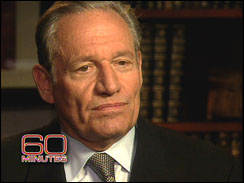Last week's "Meet the Press" featured a roundtable discussion with panelists Dana Priest, Bill Bennett, John Harwood, and William Safire.
You'll recall that Dana Priest won a Pulitzer Prize for her story in the Washington Post on how
the CIA was holding Al Qaeda detainees in secret prisons in Eastern Europe. Bill Bennett is the former Secretary of Education and currently a conservative radio talk show host and CNN commentator who has been very critical of reporters who publish classified information.
From the transcript:MS. MITCHELL: Dana, let me point out that The Washington Post, your newspaper, was behind the others but also did publish this story. And a story you wrote last year disclosing the secret CIA prisons won the Pulitzer Prize, but it also led to William Bennett, sitting here, saying that three reporters who won the Pulitzer Prize—you for that story and Jim Risen and others for another story—were, “not worthy of an award but rather worthy of jail.” Dana, how do you plead?
MS. PRIEST: Well, it’s not a crime to publish classified information. And this is one of the things Mr. Bennett keeps telling people that it is. But, in fact, there are some narrow categories of information you can’t publish, certain signals, communications, intelligence, the names of covert operatives and nuclear secrets.
Now why isn’t it a crime? I mean, some people would like to make casino gambling a crime, but it is not a crime. Why isn’t it not a crime? Because the framers of the Constitution wanted to protect the press so that they could perform a basic role in government oversight, and you can’t do that. Look at the criticism that the press got after Iraq that we did not do our job on WMD. And that was all in a classified arena. To do a better job—and I believe that we should’ve done a better job—we would’ve again, found ourselves in the arena of...
Isn't it interesting that Dana Priest managed to work in
a reference to gambling when addressing Bennett, her detractor, while he's sitting right next to her?
Crooks and Liars and
You Tube have the clip online. Watch Bennett squirm.
I'll have more in the days ahead about the controversy over news organizations publishing classified information and the recent political uproar surrounding it.
Update: I would like to add that while I don't agree with Bennett's criticism of reporters who obtain or publish classified information, I do think that Priest may have stepped over the line as far as taking a personal swipe at him. I would view gambling as a personal problem, which although it is in direct conflict with the reputation that Bennett has made for himself and the beliefs he has promoted over the years, would it be any different for going after someone's personal problems like alcoholism or drug addiction or anything else? I certainly don't think Bill Bennett's gambling problem was relevant in addressing the point that Andrea Mitchell presented to Dana Priest during the discussion.

